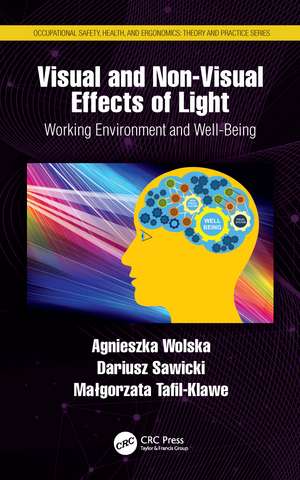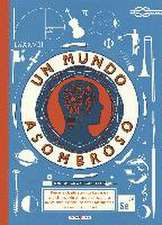Visual and Non-Visual Effects of Light: Working Environment and Well-Being: Occupational Safety, Health, and Ergonomics
Autor Agnieszka Wolska, Dariusz Sawicki, Małgorzata Tafil-Klaween Limba Engleză Hardback – 29 iul 2020
Visual and Non-Visual Effects of Light: Working Environment and Well-Being presents the impact of lighting in the working environment on human health, well-being and visual performance. The physiological explanation of the visual and non-visual effects of light on humans which discusses the biological bases of image and non-image forming vision at the cellular level may be of particular interest to any professional in the field of medicine, physiology, and biology. It is one of the intentions of this book to put forward some recommendations and examples of lighting design which take into account both the visual and non-visual effects of light on humans. These may be of particular interest to any professional in the field of lighting, occupational safety and health, and interior design.
"What effects on health can a light ‘overdose’ or light deficiency have? What is bad light? The authors of the monograph provide answers to these questions. Just as for a physicist, the dual nature of light comprises an electromagnetic wave and a photon, the duality of light for a physician comprises visual and non-visual effects."
--------------------------------------------------------Prof Jacek Przybylski, Medical University of Warsaw
"This is a unique publication in the field of lighting technology. The authors have skillfully combined both the technical and biomedical aspects involved, which is unprecedented in the literature available. As a result, an important study has been created for many professional groups, with a significant impact on the assessment of risks associated with LED sources."
--------------------------------------------Prof Andrzej Zając, Military University of Technology, Warsaw
| Toate formatele și edițiile | Preț | Express |
|---|---|---|
| Paperback (1) | 312.34 lei 43-57 zile | |
| CRC Press – 31 mai 2023 | 312.34 lei 43-57 zile | |
| Hardback (1) | 892.65 lei 43-57 zile | |
| CRC Press – 29 iul 2020 | 892.65 lei 43-57 zile |
Preț: 892.65 lei
Preț vechi: 1088.59 lei
-18% Nou
Puncte Express: 1339
Preț estimativ în valută:
170.86€ • 185.66$ • 143.62£
170.86€ • 185.66$ • 143.62£
Carte tipărită la comandă
Livrare economică 21 aprilie-05 mai
Preluare comenzi: 021 569.72.76
Specificații
ISBN-13: 9780367444198
ISBN-10: 0367444194
Pagini: 220
Ilustrații: 59 Line drawings, black and white; 14 Halftones, black and white; 9 Tables, black and white
Dimensiuni: 156 x 234 x 14 mm
Greutate: 0.49 kg
Ediția:1
Editura: CRC Press
Colecția CRC Press
Seria Occupational Safety, Health, and Ergonomics
ISBN-10: 0367444194
Pagini: 220
Ilustrații: 59 Line drawings, black and white; 14 Halftones, black and white; 9 Tables, black and white
Dimensiuni: 156 x 234 x 14 mm
Greutate: 0.49 kg
Ediția:1
Editura: CRC Press
Colecția CRC Press
Seria Occupational Safety, Health, and Ergonomics
Public țintă
Academic, Professional, Professional Practice & Development, and Undergraduate AdvancedCuprins
1. Introduction. 2. Vision Physiology. 3. Working Environment and Workers Well-Being. 4. Light - Visual Impact on Human Well-Being. 5. Lighting Design to Ensure the Convenience of Vision. 6. Light – Extracorporeal Impact on Human Well-Being. 7. Effects of Light on Human Well-Being. 8. Lighting Design with Consideration of Circadial Stimulator. 9. Light Pollution Problem. 10. Summary.
Notă biografică
Agnieszka Wolska, PhD (Eng), DSc, Head of Optical Radiation Laboratory in the Central Institute for Labour Protection – National Research Institute. She was graduated from the Faculty of Electrical Engineering (specialization: Lighting Engineering) at the Warsaw University of Technology (Poland). In 1997 she prepared her dissertation (Ph.D.): “Environmental luminance in the visual field of VDT operators and visual fatigue” and in 2014 she prepared her D.Sc. monograph “Optical radiation in the working environment”, both at Technical University of Białystok. She carries out activities in the area of lighting engineering, influence of lighting on psychophysiology of vision (experimental studies concerning evaluation of visual fatigue, visual comfort, psychomotor performance and alertness related to lighting of different parameters), visual ergonomics, hazards of optical radiation, risk assessment at the work stands.She is an expert of Group for Physical Agents (optical radiation) of Polish Interdepartmental Commission for MAC and MAI Values (from 2009). She is also a member of CIE Division 1 (Vision and colour), Polish Ergonomics Society, Polish Committee on Illumination, European experts’ network of occupational safety and health EUROSHNET.Dariusz Sawicki, PhD (Eng), DSc, Head of Department of Information-Measuring Systems in Warsaw University of Technology. He was graduated from the Faculty of Electrical Engineering (specialization: Metrology) at the Warsaw University of Technology (Poland). In 1987 he prepared his dissertation (Ph.D.): “Komputerowa metoda graficznego przedstawiania powierzchni opisanych równaniami parametrycznymi” and in 2008 he prepared his D.Sc. monograph “Wybrane problemy symulacji figury jasnych punktów z wykorzystaniem metody śledzenia promieni”, both at Warsaw University of Technology.He carries out activities in the area of computer graphics, ray tracing, global illumination, ray tracing application in lighting technology, human visual system and color perception, human computer interaction, lighting measurement, especially glare. He is a member of CIE Division 8 (Image technology), IEEE (Computer Society), Senior Member of Association for Computing Machinery (ACM) and Polish Society of Informatics.Małgorzata Tafil-Klawe, PhD, D.Med.Sc., Head of Human Physiology Department of Ludwik Rydygier Collegium Medicum in Bydgoszcz of Nicolaus Copernicus University in Toruń (Poland). She was graduated from the faculty of Medicine (specialization Human Physiolgy) at the Medical University in Warsaw, Poland. In 1982 she prepared her dissertation (Ph.D. med. Sc.) and in 1991 she prepared her D.Sc med. Sc at Medical University University of Warsaw. She got the scientific title of Professor in 2006.She carries out activities in the area of: human physiology, chronobiology with elements of chronomedicine, sleep physiology, cardiovascular regulation, respiratory medicine.
Descriere
The publication will present the impact of light in the working environment on human well-being and health. It will define the consequences of inadequate lighting on visual comfort, eye strain and shifts in the circadian cycle and their consequences for safety and health.



















